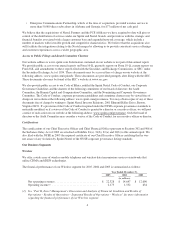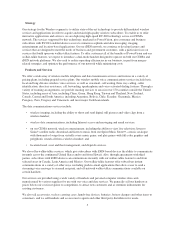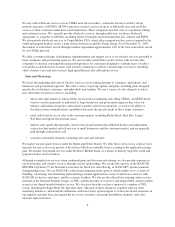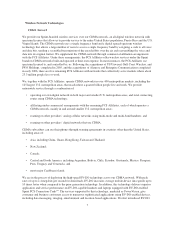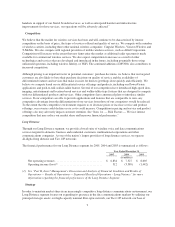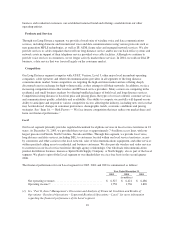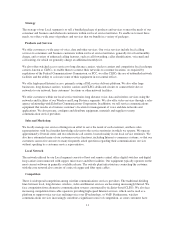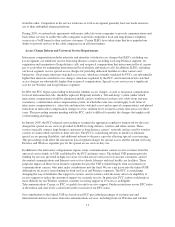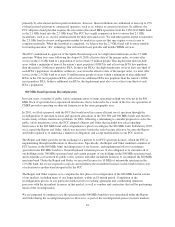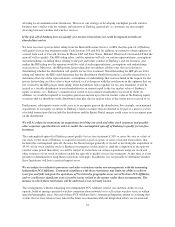Sprint - Nextel 2005 Annual Report Download - page 24
Download and view the complete annual report
Please find page 24 of the 2005 Sprint - Nextel annual report below. You can navigate through the pages in the report by either clicking on the pages listed below, or by using the keyword search tool below to find specific information within the annual report.from this order. Competitors in the service territories of our Local segment generally have not made extensive
use of their unbundled element platforms.
During 2005, we entered into agreements with major cable television companies to provide communications and
back-office services to enable the cable companies to provide competitive local and long distance telephony
services in a VoIP format to their end-user customers. Certain ILECs have taken steps that have impeded our
ability to provide services to the cable companies in an efficient manner.
Access Charge Reform and Universal Service Requirements
Intercarrier compensation includes interstate and intrastate switched access charges that ILECs, including our
Local segment, are entitled to receive from long distance carriers, including our Long Distance segment, for
origination and termination of long distance calls, and reciprocal compensation that interconnected local carriers
pay to each other for terminating interconnected local wireline and wireless calls. In addition, ILECs, including
our Local segment, receive special access charges for providing dedicated facilities to other carriers and
businesses. On average, intrastate switched access rates, which are currently regulated by PUCs, are substantially
higher than interstate switched access charges, which are regulated by the FCC, and in turn interstate switched
access charges are substantially higher than reciprocal compensation. Special access services are a significant
cost for our Wireless and Long Distance segments.
In 2001, the FCC began a proceeding to determine whether access charges, as well as reciprocal compensation
for local interconnected calls, should be replaced. Proposals include a “bill-and-keep” system (under which
intercarrier compensation would be eliminated and all carriers would recover their costs solely from end-user
customers), a unified intercarrier compensation system, in which the same rates would apply to all forms of
intercarrier compensation (i.e., interstate and intrastate switched access and reciprocal compensation), and phased
reductions in intercarrier compensation charges to a low, uniform level, except in certain rural areas over three
years. This proceeding remains pending with the FCC, and it is difficult to predict the changes that might result
or their timing and impact.
In January 2005, the FCC initiated a proceeding to examine the appropriate regulatory framework for the rates
charged for special access services provided by ILECs to long distance, wireless and other carriers. These
services typically connect large business customers to long distance carriers’ networks and are used by wireless
carriers to connect their switches to their cell sites. The FCC is considering reforms to modify or eliminate
special access pricing flexibility, and additional reforms to the price cap rules affecting special access pricing.
This proceeding could affect the amount our Local segment charges for special access and the amount our Long
Distance and Wireless segments pay for the special access services they use.
In addition to the intercarrier compensation regime, many communications carriers receive revenues from the
universal service funds, or USF, established by the FCC and many states. The federal USF program provides
funding for services provided in high-cost areas, for reduced-rate services to low-income consumers, and for
discounted communications and Internet services for schools, libraries and rural health care facilities. These
programs impact all three of our business segments because the USF is funded largely from assessments on
communications carriers, who must make contributions into the fund. We are a net payor into the federal USF,
although we do receive some funding for both our Local and Wireless segments. The FCC is considering
changing the way it distributes this support to carriers, and its actions could adversely affect our eligibility to
receive support or reduce the amount of support we currently receive. In particular, FCC actions could make it
more difficult for our Wireless segment, currently receiving support in 19 states as an Eligible
Telecommunications Carrier, or ETC, to qualify for and to receive support. Further restrictions on our ETC status
at the federal and state levels could result in the rescission of our ETC status.
Our contributions to the federal USF are based on an FCC-prescribed percentage of our interstate and
international end-user revenues from telecommunications services, including from our Wireless and wireline
13



